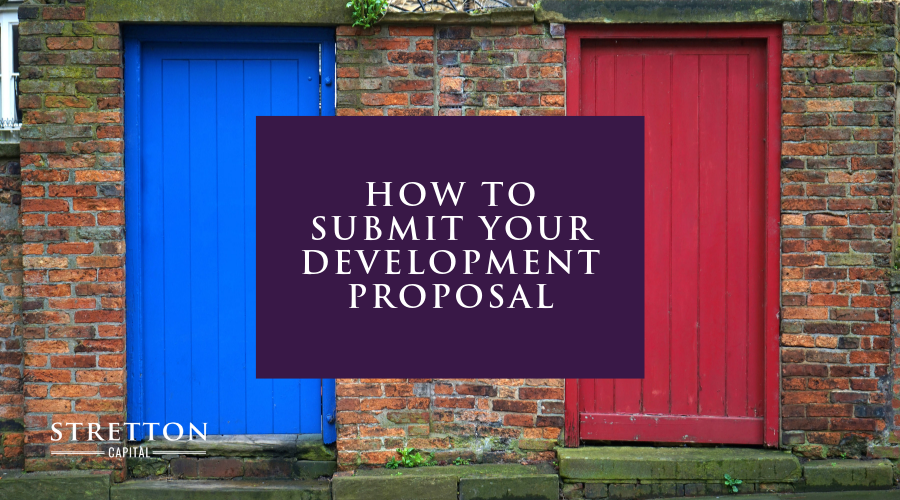Submitting a development finance proposal

Every lender has a different way of assessing a deal and here at Stretton Capital we are no different.
Development finance in particular is looked at differently than a straightforward bridging deal and the requirements are also different. Here we will explain what we require and just as importantly, what we don’t need as part of the initial assessment.
We will also explain the difference between ground up development finance and other types of development finance.
Submitting your initial development finance enquiry
This is where there is a lot of confusion. We understand that brokers and borrowers want to send us as much information as possible but this isn’t necessary for the initial consideration of the deal.
There are 3 key tenets of any development finance loan. They are:
-
The borrower
-
The asset
-
The numbers
For a development finance deal we need
- Full security address (location of security site)
- Full name of borrower and/or the borrowing entity. This could be a sole trader, limited company, limited liability partnership, etc
- Details of borrower experience (a CV/bio would be helpful outlining recently completed developments) especially in the case of ground up development finance
- Details of build team (experience, trading accounts of main contractor). The reason we ask for trading accounts for the main contractor is to ensure that they have sufficient financial standing so that if there is a gap between the work being carried out and the drawdown of the next tranche of funds, that the contractor has the cash to continue to buy materials and pay his building team
- Details of the project (what they are doing, what the security currently is; particularly important for us to know if there is a structure at the security address or if it is just bare land)
- Details of the current and/or proposed planning permission. Ideally, a link to the planning portal would be extremely useful.
- Full cost breakdown (purchase price, estimated valuation, borrower contribution, build costs, individual selling costs, total Gross Development Value (GDV)
- The exit. In other words, how will our loan be repaid when the term ends. Usually this is one of two things; Sale or refinance. If it is sale then we need to be certain that the properties being built will sell for the price they are being advertised at. Is there demand for this type of property in the area? Is there a ceiling on how much people will pay for a property in this area and does this newly built property fall in line with that or exceed it? If it is refinance that is the preferred exit then will the borrowers have the credit worthiness to be able to refinance to a high street lender?
The information requested above is enough for us to assess the deal without burdening us with too much information that is unnecessary at this stage.
What we don’t require at initial enquiry stage
- We do not require architects drawings or plans
- Accounts/P&L/balance sheet for the borrower(s), sole trader or limited company
- Bank statements
Obviously as the case progresses we will need a lot more information. However, the initial enquiry stage needs to be simple so that we can get back to the borrower or broker in a timely fashion with a positive or negative response.
It is pointless us asking for a lot of detailed information at this stage if, as mentioned above, the key tenets of the deal don’t stack up. Namely; the borrower, the security or the headline numbers.
Once we are comfortable with the above, we will send you indicative Heads of Terms which will outline the following:
- How much we can offer the borrower on day 1 (against the purchase price) and against the proposed development costs.
- Our monthly interest rate, arrangement fee and any exit fees.
- Loan term
- All other fees (if applicable)
- Request for further information including ID and proof of address
If it’s negative then we will explain our reasons why we can’t do the deal as it will help you place it elsewhere or at the very least, allow you and your borrower to restructure the deal (if possible)
The process after approval
Solicitor
This will require the borrower to appoint a suitably experienced and knowledgable Solicitor. A licenced conveyancer is not acceptable simply because a development finance loan is a lot more complicated than a standard bridging loan or commercial mortgage.
The Solicitor firm must also have a minimum of 2 partners.
If we were being asked what is the single biggest factor regarding the speed of loan completion and the ease in which it has been done, we would say it is the quality of the lawyer you use, every single time. Our lawyers have many years of experience in development finance and can often spot a problem or issue long before it rears its head.
Because of this, we reserve the right to veto the borrowers solicitor if we feel it will hinder the transaction.
Valuer
We arrange all of our valuations through a panel manager. A panel manager is simply a way of aggregating a large number of valuers together so that it is easier and quicker to find a valuer who can help via one enquiry, rather than us having to call or email 5 or 6 valuers directly to find out their availability and pricing.
Ground Up Development Finance
Quantity Surveyor (QS)
The QS will provide us with an initial report on the development project and will also be responsible for visiting the site every time the borrower requires a drawdown. Once they have visited and assessed the work that has been carried out, they will provide us with a report to confirm the same and we will then release funds (to cover the work that has been done) directly to the borrower.
The average cost of the QS’s initial report is c£1,000 with each report coming in at around £750.
All funding like this (or drawdowns as it’s known in the business) are done in arrears which means the work is done first and then when checked by the QS, the money is released thereafter.
Get in touch with us
To apply for a development finance loan or to enquire about our bridging loan products, you can email us here or call us on 01244 732630. Alternatively, you can find out more about the team by visiting our about us page.

